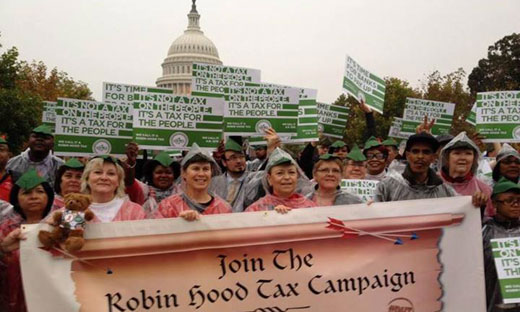
WASHINGTON – After more than 200 advocates of the “Robin Hood tax” marched up Constitution Ave. here today to the Longworth House Office Building, lawmakers heard the vice president of the European Parliament, Ani Podimata, describe a solution for raising hundreds of billions of dollars a year – a tiny tax on financial speculation now being implemented across Europe.
The financial transaction tax amounts to only fractions of a penny on the dollar value of every stock, bond and derivatives trade – five cents per $100. Estimates of its potential return to the U.S. treasury run as high as $700 billion a year.
Although opinion polls show strong support for the tax speakers warned that the House GOP would oppose it and that even some Democrats are cool to the idea. They noted that right-wingers in the House plan to bring up a bill repealing part of the restrictions that now exist on the financers’ derivatives.
Republican maneuvering in favor of Wall Street, however, failed to dampen the enthusiasm of the nurses among the demonstrators. Their union, National Nurses United, led today’s lobbying effort.
“Nurses of America have a message for Wall Street,” declared NNU co-President Jean Ross. “You have the resources to heal America, to give access to quality education, rescue climate change and create a sutable economy, especially living wage jobs.”
“What has Wall Street done for us lately?” Ross asked. “Was it good for America to turn to them to take bailout money we provided and gamble with it again? Was it right for America for them to make a fortune while people went bankrupt?” The crowd responded “No!”
Among those marching and testifying before lawmakers today was Rep. Keith Ellison, D-Minn., whose bill, HR 1579, creates a financial transaction tax but exempts stock and bond trades of ordinary people who don’t make their living from professional trading – individuals with income up to $50,000 and couples earning up to $75,000.
Jeffrey Sachs, one of numerous progressive economists who backs the tax, also testified today. He said Ellison’s bill, called the Inclusive Prosperity Act, would generate massive funding for jobs, housing, healthcare, fighting climate change, and finding a cure for AIDS.
“The basic idea is a tax on every financial transaction, the equivalent of a sales tax,” explained Robert Pollin, economics professor at the University of Massachusetts. “With the financial transaction tax we can raise the revenue we need and discourage excessive speculation on Wall Street. It’s being done in the world’s second largest financial market, London, and the fastest growing security markets in the world, including China, Hong Kong, Singapore, and Russia. If they can do it, so can we.”
“With the latest Congressional super committee on budget deliberations about to meet in the aftermath of the brinkmanship over federal funding, a change in tone is needed in Washington,” said Karen Higgins, RN, co-president of National Nurses United. “We are calling on Congress and the White House to refocus on a human needs budget, not just an endless cycle of more austerity and more cuts. We need the Robin Hood tax.”
“The United States has recognized that we can end the AIDS pandemic,” said Jennifer Flynn of Health GAP. “Yet if the constant focus is on budget cuts, we risk the AIDS crisis spiraling out of control. The way to avoid this is to join all of the other financial markets and implement a Robin Hood Tax.”
In addition to the nurses, members of numerous other unions particpated in the action today including the Amalgamated Transit Union, the Coalition of Labor Union Women, the Communications Workers, the Chicago Federation of Labor, the Chicago Teachers Union, the Jewish Labor Committee, the Postal Workers, the California School Employees Association, the Farm Labor Organizing Committee, the Machinists, Interfaith Worker Justice, the Auto Workers, Jobs with Justice, and the Kentrucky AFL-CIO.
The pushback from big business is not just happening in the U.S. The planned Jan. 1, 2014 start of the financial transaction tax agreed to by 11 European countries is being delayed because of this pushback. The Deutsche Bank has called it “counterproductive,” which critics of the bank say is just another way for the bank to point out that the tax would mean less money for the bank.
Photo: Nurses were enthusiastic particpants in the effort to lobby lawmakers today for a financial transactions tax. Photo credit, National Nurses United Facebook page











Comments